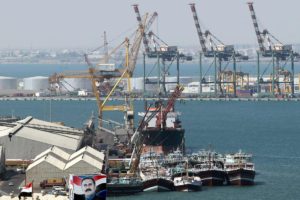 The Security Council has urged warring parties in Yemen to allow humanitarian convoys to safely reach all conflict-affected governorates without hindrance, while also asking that all Yemen’s ports remain fully open to commercial and relief supply imports.
The Security Council has urged warring parties in Yemen to allow humanitarian convoys to safely reach all conflict-affected governorates without hindrance, while also asking that all Yemen’s ports remain fully open to commercial and relief supply imports.
These calls were made in a Presidential Statement issued Thursday by the 15-member body.
According to the UN Office for the Coordination of Humanitarian Affairs (OCHA), 20.7 million people in Yemen need some kind of humanitarian or protection support, with some 9.8 million in acute need of assistance.
In the Statement, the Council noted “with great concern” the impact that access restrictions on commercial and aid imports have on the humanitarian situation, and called on the parties to “immediately facilitate access for these essential imports into the country and their distribution throughout in order to reach the entire civilian population.”
“In this regard, the Security Council calls for the full and sustained opening of all Yemen’s ports, including Hodeida and Saleef ports, and stresses the importance of keeping these functioning and open to all commercial and humanitarian imports, including food, fuel and medical imports,” the Statement added.
The Council also called for increased access to Sana’s Airport for lifesaving humanitarian supplies and movement of urgent humanitarian cases.
The top United Nations relief official, Mark Lowcock, had last January expressed deep concern about the deteriorating humanitarian situation in Yemen, noting that a record 22.2 million people were in need of assistance – 3.4 million more than last year.
The UN Office for the Coordination of Humanitarian Affairs (OCHA) had earlier launched the 2018 Yemen Humanitarian Response plan, which requires $2.96 billion to provide life-saving assistance and protection to more than 13 million people across the country this year.
Saudi Arabia pledged nearly $1 billion and the United Arab Emirates vowed to give an additional $500 million in commitment from regional donors.
